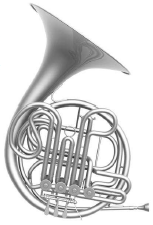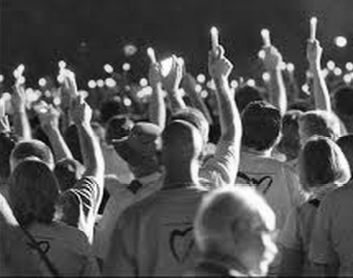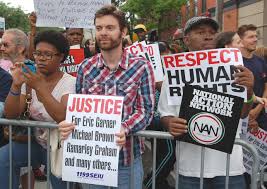RevLynn
Be Perfect
April 30, 2015Even with the best of intentions, it turns out that being perfect never quite works out.
REsources for Living
April 1, 2015Podcast: Download (4.5MB)
Subscribe: More
 There are plenty of things to wonder about in the Easter story, but here’s one of them. If Jesus was a miracle healer, someone who cured everything from blindness to skin disease, someone who even raised a man from the dead, then why didn’t he heal himself? Read more →
There are plenty of things to wonder about in the Easter story, but here’s one of them. If Jesus was a miracle healer, someone who cured everything from blindness to skin disease, someone who even raised a man from the dead, then why didn’t he heal himself? Read more →
REsources for Living
March 1, 2015Podcast: Download (4.3MB)
Subscribe: More
 A few months back 17-year-old Malala Yousafzai became the youngest person to win the Nobel Peace Prize. Read more →
A few months back 17-year-old Malala Yousafzai became the youngest person to win the Nobel Peace Prize. Read more →
REsources for Living
February 1, 2015Podcast: Download (6.0MB)
Subscribe: More
 A few years ago, Unitarian Universalists got a new nickname. In 2010 lots of UUs went to Arizona to protest the way immigrants were being treated. Read more →
A few years ago, Unitarian Universalists got a new nickname. In 2010 lots of UUs went to Arizona to protest the way immigrants were being treated. Read more →
REsources for Living
January 1, 2015Podcast: Download (5.8MB)
Subscribe: More
I can well remember from my childhood that most adults had a very strange habit. Pretty much any time you saw one of your parents’ friends, or an out-of-town relative, they would greet you in exactly the same way… Read more →
Breathe: A Poem
December 23, 2014
How can I breathe at a time like this,
when the air is full of the smoke
of burning tires, burning lives?
Just breathe, the wind insisted.
Easy for you to say, if the weight of injustice
is not wrapped around your throat,
cutting off all air.
I need you to breathe.
I need you to breathe.
Don’t tell me to be calm
when there are so many reasons
to be angry, so much cause for despair!
I didn’t say to be calm, said the wind,
I said to breathe.
We’re going to need a lot of air
to make this hurricane together.
by Lynn Ungar
12/4/14
www.lynnungar.com
Read more: http://www.patheos.com/blogs/uucollective/2014/12/breathe-a-poem/#ixzz3MkFuxZzd
Seeing is Believing
December 12, 2014In the wake of Ferguson, in the wake of Trayvon Martin and Oscar Grant and the 12-year-old boy with a pellet gun who was recently shot by a police officer in Cleveland and all the other young Black men killed because a White man found them threatening, it’s hard to know what to say. It’s hard to know what to say to my Black teenage daughter as we take the long way home from downtown Oakland to avoid protests that have started to turn violent. It’s hard to know what to say to Black friends who are grieving publicly on Facebook, who feel assaulted once again by a system which has betrayed them over and over. And it’s hard to know what to say to a good, kind-hearted White friend who feels that her police officer son is being defamed by complaints against the police, and says that we all experience racism, and that we should just all be nice to one another.
kind-hearted White friend who feels that her police officer son is being defamed by complaints against the police, and says that we all experience racism, and that we should just all be nice to one another.
It’s hard to know what to say, and it’s hard not be impatient with people who seem hopelessly out of touch. I have to start by remembering that we all speak from what we know, what we experience, what we see. We speak as eye-witnesses to our own lives. Which means that for a lot of White people, racism doesn’t really exist, or exists only as a few isolated instances. After all, what most of us who are White see in our daily lives is that the police are there to keep us safe. What we see is that our walking down the street or driving a car is not a subject for police investigation. What we see is that the folks who turn to look at us in stores are wondering if we need help. That’s reality.
And if that’s your reality then rage against the police seems misplaced, unreasonable, unjustified. If the justice system has always looked to you like, well, justice, then protesters on the streets are threats to the public safety, not advocates pushing for public safety. We know what we see. Who we imagine the public to be are the people who look or dress or talk like us.
I suspect that everyone who drives has been in the position of wanting to tell off the idiot who has come to a complete stop in the middle of the street in front of us. Maybe we honk our horn, or just sit there grumbling about the rude, clueless twit blocking our way for no reason—until we finally see the pedestrian crossing past the vehicle that was blocking our view. It turns out that the driver in front of us could see something that we couldn’t, was acting on information that we didn’t have.
It isn’t easy. The folks with the privilege have every habit of assuming what they see is the “real world,” and every incentive to stay in that comfortable world. The tricky part is that it’s really the job of the White people to help other White people see around the corner. There are many terrific books and blog posts and articles by people of color about their experiences, and White folks would do well to read them. But ultimately it is the responsibility of the White people who’ve caught a glimpse of the pedestrian in the road to help other White people see what is beyond their field of vision. Even when it’s uncomfortable. Even when you don’t quite know how to do it. Even when you’re pointing toward something that’s not altogether clear to you.
Maybe it’s enough to just ask everyone to enter the conversation aware that the fact that you don’t see something doesn’t mean it isn’t there.
Miracles and Wonders
November 28, 2014Podcast: Download (10.3MB)
Subscribe: More
 A man arrives at a wedding banquet and finds that they have run out of wine. Mysteriously, plain water is transformed into wine sufficient for all the guests. Read more →
A man arrives at a wedding banquet and finds that they have run out of wine. Mysteriously, plain water is transformed into wine sufficient for all the guests. Read more →
Salvation
November 27, 2014By what are you saved? And how?
Saved like a bit of string,
tucked away in a drawer? Read more →
Support the CLF
Can you give $5 or more to sustain the ministries of the Church of the Larger Fellowship?
If preferred, you can text amount to give to 84-321
Newsletter Signup
About
Quest for Meaning is a program of the Church of the Larger Fellowship (CLF).
As a Unitarian Universalist congregation with no geographical boundary, the CLF creates global spiritual community, rooted in profound love, which cultivates wonder, imagination, and the courage to act.
Contact
Church of the Larger Fellowship Unitarian Universalist (CLFUU)
24 Farnsworth Street
Boston MA 02210






